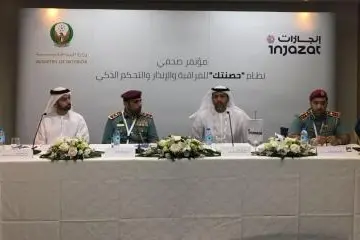PHOTO
Region's largest automated integrated system for accelerating emergency response to ensure 24/7 public safety
UAE - The UAE Ministry of Interior, represented by the Civil Defence Headquarters, in partnership with Injazat Data Systems has today (Monday, October 9, 2017) held a press conference unveiling ‘Hassantuk’ – the UAE’s Smart Monitoring, Alert and Control System – at the Dubai World Trade Center. Hassantuk is the largest automated and integrated fire and life safety monitoring system of its kind in the region. It is a Public-Private Partnership between the Ministry of Interior and Injazat Data Systems designed to support UAE Vision 2021’s goal of making the UAE one of the safest countries in the world.
This step follows the partnership agreement that was signed recently between the Ministry and Injazat under the patronage and support of H.H. Sheikh Saif bin Zayed Al Nahyan, Deputy Prime Minister and Minister of Interior.
The conference highlighted the capabilities of the automated 24/7 public safety initiative and how it will support the safety of people and property across the UAE. The vision, mission and objectives behind the system were presented as well.
The event’s distinguished speakers were Major General Jassim Mohammed Al Marzouqi, the Ministry of Interior’s Commander of Civil Defence, Lt. Colonel Expert / Ali Hassan Almutawa, Assistant General Manager for Smart Services at Dubai Civil Defence, Mr. Khaled Al Melhi, Chief Executive Officer of Injazat Data Systems, and Mr. Atif Albraiki, Injazat Data System’s Director of Strategic Projects.
Under the Hassantuk System, state-of-the-art Alarm Transmission Equipment is connected to the building’s fire and life safety systems to ensure that any emergency alarm is transmitted to a central Alarm Receiving Center - the ARC- within milliseconds. A team of professional ARC operators verifies if the alarm is genuine and reports all valid emergencies to the Civil Defence Main Operations Room so that the appropriate assistance can be dispatched immediately.
One of the unique features of the system is that it identifies the specific type of emergency and its exact location as well as providing building intelligence. These features enable the Civil Defence to deploy the right personnel and equipment to the right place.
Hassantuk will connect more than 150,000 existing buildings and facilities round-the-clock to ensure the highest levels of building maintenance and safety and protect life and property.
Major General Jassim Mohammed Al Marzouqi, Commander of Civil Defence, UAE Ministry of Interior, said: “The UAE Vision 2021 National Agenda aims to transform the country into one of the safest places in the world, which is why one of our top priorities at the Ministry of Interior is to optimize emergency response capabilities nationwide. We recognize the great value of advanced technology in achieving this goal, which is why we have partnered with Injazat Data Systems to ensure the development of a robust and reliable solution. Hassantuk is a major milestone in our efforts to achieve the highest levels of prevention, safety and emergency readiness across the country.”
Khaled Al Melhi, Chief Executive Officer at Injazat Data Systems, added: “Hassantuk will help to dramatically reduce the current Average Emergency Response Time of around 13 minutes as reported by the Ministry of Interior. The Civil Defence will be fully aware of any genuine fire or life safety emergency in less than 120 seconds allowing the appropriate assistance to be dispatched immediately.”
“The Alarm Receiving Center currently being built will incorporate the latest technologies to ensure uninterrupted, accurate and rapid transmission of all alarms and events. The integrated solution is unique to the region and will be the foundation for future National public safety initiatives,” he added.
The first buildings will be connected to Hassantuk by the first quarter of 2018, with all installations to be completed by 2023.
The Rollout Plan is geared towards quick, massive and strategic deployment across the entire UAE. It will initially focus on Critical National Infrastructure, Buildings of National Importance, Buildings at Risk, and other Priority Buildings including schools, hospitals and public places.
-Ends-
© Press Release 2017




















